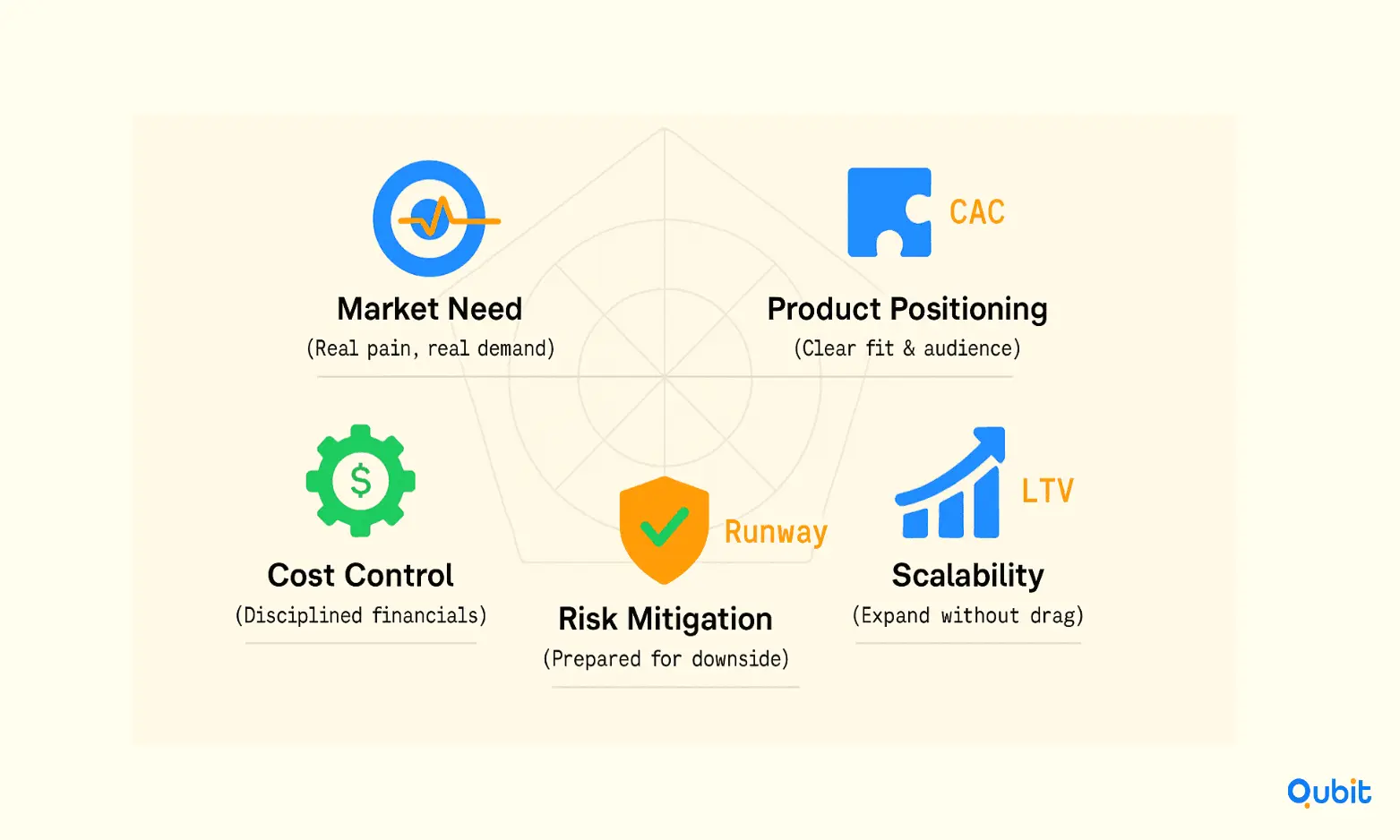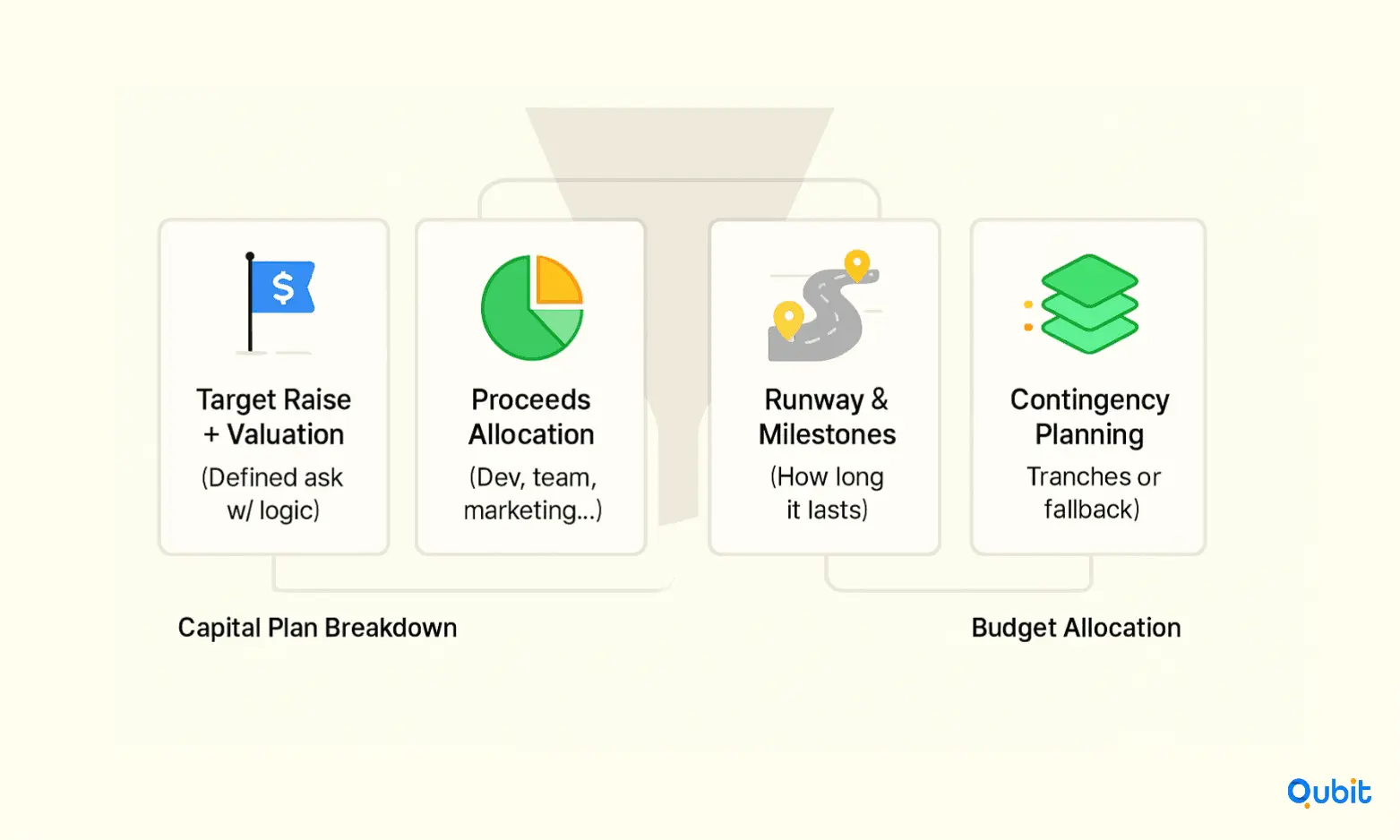Securing funding for AI startups requires more than just a groundbreaking idea—it demands a deep understanding of investor expectations. As AI fundraising continues to evolve, founders must prepare to address critical questions that demonstrate their readiness for growth and scalability. Investors are keen on assessing not only the technology but also the business model, market potential, and operational resilience.
Your analysis on investor questions is contextualized by the discussion in how to raise money for AI startup, which outlines broader funding methods within the AI sector. This blog aims to equip AI founders with insights into the investor Q&A process, ensuring they can confidently articulate their vision while addressing concerns about AI due diligence.
Investor Key Questions
When investors evaluate startups, their questions often reveal the priorities that drive funding decisions. Founders must be prepared to address critical areas such as market need, product positioning, cost control, risk mitigation, and scalability. These inquiries are not just about understanding the business but assessing its potential for long-term success.

Addressing Market Need
Investors want to know if your AI solution solves a real-world problem. Demonstrating a clear market need is essential, as it validates the demand for your product or service. Founders should present data-backed insights, such as customer pain points, industry trends, and competitor gaps, to illustrate how their solution stands out.
Product Positioning and Clarity
A well-defined product positioning strategy reassures investors that your startup understands its audience and competitive landscape. Highlighting unique features, benefits, and use cases can help clarify how your product fits into the market. This clarity builds confidence in your ability to attract and retain customers.
Cost Control and Financial Discipline
Financial sustainability is a top concern for investors. They often ask about cost control measures and revenue projections to ensure the business can operate efficiently. Founders should prepare detailed financial models and explain how they plan to optimize resources while scaling operations.
Risk Mitigation Strategies
Every startup faces risks, but how you address them matters. Investors expect founders to identify potential challenges, whether operational, financial, or market-related, and outline proactive strategies to mitigate them. This demonstrates foresight and preparedness, key traits for successful leadership.
Scalability and Growth Potential
Scalability is a critical factor in startup evaluation. Investors look for evidence that your business model can expand without compromising quality or profitability. Founders should showcase their growth strategies, supported by metrics like customer acquisition costs, lifetime value, and market expansion plans.
A proactive, data-driven approach to answering investor Q&A builds trust and credibility. By addressing these key areas with precision and transparency, founders can position their startups as viable, scalable, and resilient investments.
Essential Due Diligence Materials (Have These Ready!)
Investors (or their analysts) will demand these docs, often within days of first interest. Prepare in advance:
- Technical documentation and architecture diagrams
- Rationale and provenance for all training data (incl. third-party licenses, privacy/compliance records)
- IP assignment and patent filings
- Commercial contracts, customer terms, and revenue records
- Cap table, SAFE/note summary, and employee equity pool details
- Model performance benchmarks and comparison data sets
- Security, privacy, and AI bias/ethics policies
- Updated financial model (multi-scenario) and unit economics worksheet
Have these in a shared, professionally organized data room. Not being ready breeds doubt.
What Investors Need to Know About Your Team
Investors carefully assess the strength and composition of your founding team before making any funding decisions. They want to know not just who is behind the business, but why this group is uniquely qualified to succeed in the competitive AI landscape.
Begin by introducing each core team member's background and expertise, focusing on experience in artificial intelligence, business development, and your specific market. Highlight individual and collective achievements such as successful product launches, advanced research, or prior entrepreneurial success.
Explain how the team covers the essential skills needed for your business to thrive, including technical leadership, engineering, operations, and go-to-market execution. If there are skill gaps or areas that need strengthening, be transparent and describe your plan for recruiting additional talent as your company grows.
Showcase the team’s ability to work collaboratively and communicate a shared vision. Investors look for cohesive, committed founders who can both attract and retain high-performing employees. Mention any advisory board members or early contributors whose expertise or reputation adds further credibility to your venture.
By proactively addressing these investor questions about your team, you reinforce confidence in your startup’s capacity to deliver on ambitious goals and adapt as you scale.
Startup Evaluation Framework
Evaluating a startup’s potential requires a clear and structured approach. The DVF framework: Desirability, Viability, and Feasibility, offers founders a comprehensive way to assess their business idea across three critical dimensions. By focusing on these pillars, startups can identify strengths, address weaknesses, and position themselves for sustainable growth.
Breaking Down the DVF Framework
Desirability: Understanding Market Demand
Desirability centers on whether the product or service meets a genuine market need. Founders must evaluate their target audience, analyze customer pain points, and determine if their solution resonates with potential users. A desirable startup idea is one that solves a pressing problem or fulfills a specific demand, ensuring long-term customer engagement.Viability: Ensuring Financial and Strategic Sustainability
Viability examines the financial and strategic aspects of the startup. This includes revenue models, cost structures, and the overall market opportunity. A viable startup demonstrates the potential for profitability while aligning with broader industry trends. Founders should also consider scalability and the ability to adapt to market changes over time.Feasibility: Assessing Operational Execution
Feasibility focuses on the operational side—whether the startup has the resources, technology, and team to execute its vision. This dimension evaluates the practicality of turning an idea into reality, considering factors like technical expertise, supply chain logistics, and time-to-market.
Beyond DVF: Additional Evaluation Considerations
While the DVF framework provides a solid foundation, startups must also consider competitive advantages and risk mitigation strategies. Identifying unique differentiators—such as proprietary technology, exclusive partnerships, or a strong brand, can help a startup stand out in a crowded market. Additionally, founders should proactively address potential risks, from regulatory challenges to market saturation, to ensure resilience.
For startups preparing to secure funding, aligning their evaluation process with investor expectations is crucial. A detailed examination of investor interactions naturally aligns with the perspectives in AI startup investor due diligence Q&A, offering clarity on handling comprehensive Q&A sessions.
By leveraging the DVF framework and incorporating these additional considerations, founders can build a robust foundation for their startup, ensuring both short-term success and long-term sustainability.
Funding Request and Use of Proceeds
When preparing to raise capital, clearly articulating your funding request is essential for building investor confidence. Investors want to understand not only how much capital you seek but also the rationale behind the amount and how you plan to deploy it effectively.

Start by specifying the total funding amount you are targeting and the proposed valuation of your startup. Explain the basis for these figures, whether they arise from detailed financial modeling, market comparables, or milestones your company aims to achieve.
Next, break down the use of the proceeds into key categories. Common allocations include product development, talent acquisition, marketing and customer acquisition, operational expenses, and regulatory compliance. Providing a clear allocation plan demonstrates financial discipline and strategic planning, reassuring investors that their capital will be deployed to accelerate growth and maximize return.
Detail the expected runway this funding will provide, highlighting how long the capital will sustain operations while achieving defined business milestones. This timeline helps investors assess when further funding rounds might be required or when the startup expects to reach profitability.
Finally, mention any contingencies or plans for variable capital needs, such as phased funding or milestone-based tranches. This transparency shows adaptability and a thoughtful approach to financial management, reducing perceived risk.
Pro Tips for Founders
- Practice clarity: Can a friend outside of tech explain your value prop after hearing your pitch?
- Have documentation ready: Diligence moves fast—be ready with technical whitepapers, cap tables, financial models, and policy docs.
- Be transparent about gaps: Don’t fake it, if you’re early, speculative, or working through risks, admit it and show your plan.
- Anticipate follow-ups: Each answer may lead to deeper questions about economics, technical differentiation, or customer validation.
Conclusion
Securing investment requires more than just a compelling idea; it demands preparation, clarity, and strategy. Throughout this article, we’ve explored key approaches such as mastering investor Q&A sessions, applying the DVF framework, and implementing actionable evaluation steps. These strategies ensure that your pitch is not only narrative-driven but also backed by thorough due diligence, making it resonate with potential investors.
A well-structured pitch and a deep understanding of your business’s financial and operational details can significantly enhance your chances of success. At Qubit Capital, we specialize in helping startups refine their fundraising strategies and connect with the right investors.
If you're ready to take your fundraising efforts to the next level, we’re here to assist. Reach out to us and explore how our Fundraising Assistance service can support your journey toward securing the investment your business deserves.
Key Takeaways
Investors prioritize clear problem identification and market validation.
Sustainable growth and effective cost management are critical to long‐term success.
The DVF framework provides a structured method to evaluate startup potential.
Curated Emerj content offers actionable insights and diverse industry perspectives.
Engaging the right investors is essential for securing funding.
Frequently asked Questions
What do investors look for in AI startups?
Investors typically seek a clearly defined problem, robust market validation, and a scalable solution underpinned by a solid revenue model.


 Back
Back



